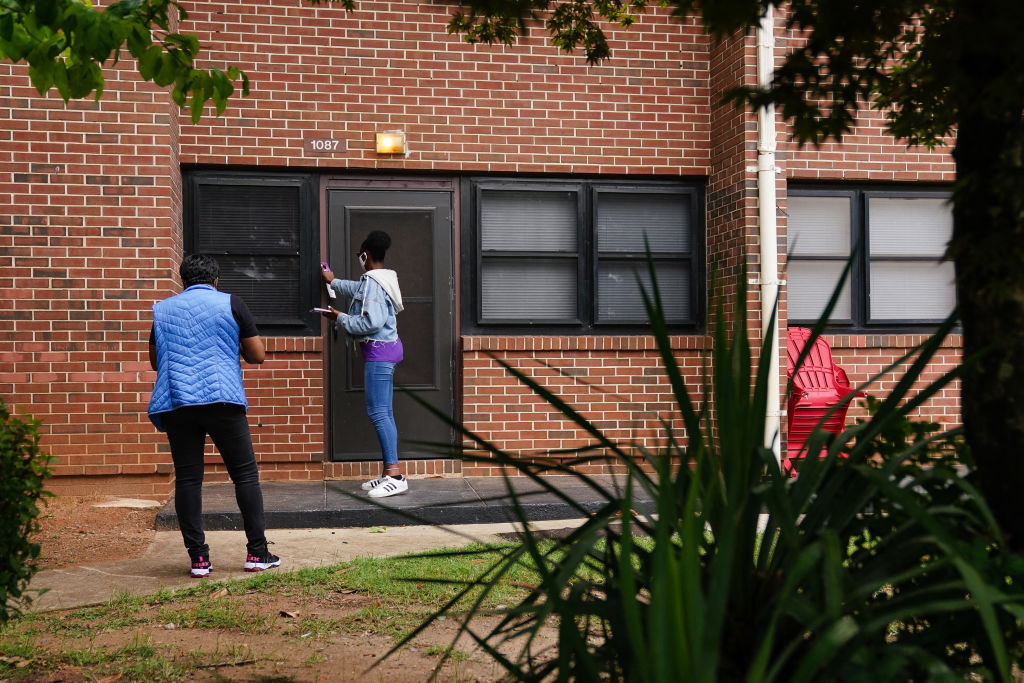
Source: ELIJAH NOUVELAGE / Getty
Every election cycle, voters are inundated with messages about the importance of voting. Many voters take those messages to heart and commit to vote, plan to vote and then attempt to do so. With little to no advance notice, some are shocked when they appear to cast their ballot, only to be told that their name is not on the voting roll.
Let that sink in. Imagine receiving pamphlet after pamphlet encouraging you to turn out and vote only to show up and be denied the opportunity to do so. Imagine anticipating the day you get your “I Voted” sticker only to be turned away because your name does not appear on the voting rolls.
You haven’t moved. Your rights haven’t been revoked because of a felony conviction. Nothing about your voting eligibility has changed. And yet, you’re denied the right to vote outright or offered a provisional ballot, which isn’t consistently counted on time.
Check out the Election Resource Center for more information!
That is the plight of millions of voters of color in states across the country, including Tennessee. According to the Brennan Center for Justice, between 2014 and 2016, states removed almost 16 million voters from the rolls – a 33 percent increase from the period between 2006 and 2008. The states with the highest increases in purges were states with a history of voting discrimination.
While election officials must routinely review the voter rolls, when done irresponsibly, officials can remove millions of voters from the rolls with little notice. The voters most likely to be removed are people of color, young voters and persons living in poverty. Make no mistake about it. Reckless voter purges are indeed a voter suppression tactic.
They may look different than tactics showcased decades ago, but they sting. The entities deploying those tactics may not have batons, fire hoses, and aggressive dogs like our ancestors saw in the 1950s and 1960s, but that doesn’t mean their actions are benign.
Increasingly, voter suppression tactics – such as revoking the right to vote for persons with felony convictions – bar voters of color from participating in our nation’s democracy. Knowing that one lives in a democracy but is systemically denied the right to vote is discomforting. But it is also disempowering. At a time of rising inflation, housing costs and other challenges, it is imperative that all voters can elect candidates who align with their values.
People cannot change the trajectory of their future without the ballot. And it becomes harder to self-direct and has agency over one’s life when one cannot vote or elect candidates of choice. But today, voter purges coupled with felony disenfranchisement limit the political participation of Black voters and voters of color. That is not a function of chance; it is a matter of choice – of those who do not want us to vote.
Consider Memphis. Home to 400,000 Black people, Memphis has the largest percentage of African Americans in Tennessee. It is a region where Black people could theoretically determine their fate. But attacks on the right to vote make doing so difficult. For instance, in Shelby County, the county seat of Memphis, 100,000 voters were removed from the rolls in 2021. And that’s not all. According to the Sentencing Project, 456,000 people in Tennessee were denied the right to vote due to a criminal record in 2016. Because most Black people in Tennessee live in Memphis, many of the people who have been disenfranchised are in Memphis as well.
Unfortunately, from 2016 to 2020, WPLN News reported that “an additional 35,000 Tennesseans with felony convictions have lost the right to vote. Meanwhile, just 3,415 have restored their right to vote.” This issue is so important that my organization, Memphis Artists for Change, routinely hosts voter restoration events, such as the one we held on Aug. 27. We know that people want to vote, and our job is to change the conditions so they can do so.
Nationwide, the Sentencing Project reports that “about 5.2 million Americans are barred from the polls because of a criminal record.” Certainly, voter purges are a growing threat to voter participation. But so, too, are felony disenfranchisement laws.
As advocates prepare to get out the vote messages, they must also push back on felony disenfranchisement in places such as Tennessee. While voters are responsible for getting out and voting, the system must accommodate their participation. It’s up to us to make that happen.
Tameka Greer is the executive director of Memphis Artists for Change.
SEE ALSO:
Know Before You Vote: Election Law Changes Ahead Of The 2022 Midterms
The post Op-Ed: Voter Suppression Looks Like Voter Purges and Felony Disenfranchisement appeared first on NewsOne.
Op-Ed: Voter Suppression Looks Like Voter Purges and Felony Disenfranchisement was originally published on newsone.com




